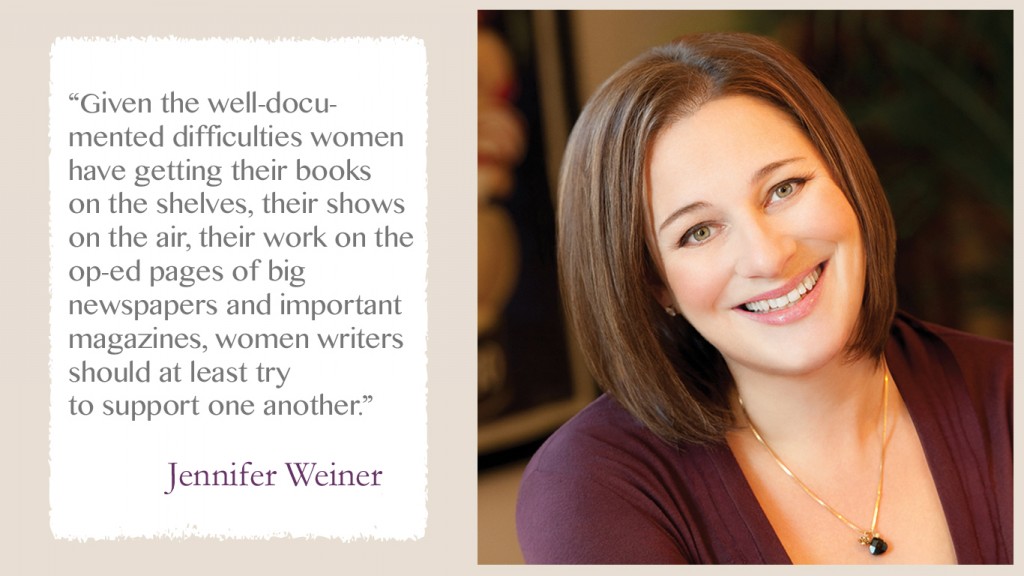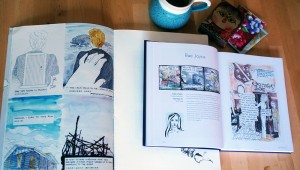 The literary world is not as boring as some might think. Every now and then, good disputes arise and keep us all on fire. I have been reading lately about those in the middle of which we find writer Jennifer Weiner, author of books such as Good in Bed or In Her Shoes, which was turned into a movie with Shirley MacLaine, Toni Collette and Cameron Diaz. Her latest book is The Next Best Thing.
The literary world is not as boring as some might think. Every now and then, good disputes arise and keep us all on fire. I have been reading lately about those in the middle of which we find writer Jennifer Weiner, author of books such as Good in Bed or In Her Shoes, which was turned into a movie with Shirley MacLaine, Toni Collette and Cameron Diaz. Her latest book is The Next Best Thing.
So, Jennifer Weiner has been very vocal about how literature written by women is constantly ignored by the critics. Her outrage is valid. The organization Vida, Women in Literary Arts, keeps an eye on the statistics, and according to their research, in 2012, The New York Times Book Review covered 488 male authors versus 237 female authors. The numbers were similar in the previous years: 520 vs. 273 in 2011 and 524 vs. 283 in 2010.
It looks like she has become a sort of a crusader for the inclusion of women’s literature into the pages of any serious literary journal and in any literary dialogue, and she is suffering a lot of backlash because of her uncensored comments.
I haven’t read any of Jennifer Weiner’s books yet, but I think I might pick one up because the author seems like such an intelligent, down-to-earth, and very funny woman. And she is not afraid to voice facts that are hard to hear for many. I am not a big reader of chick-lit, although I’ve always wished I had a little bit of that sense of humor (for that reason only, I should read more of the genre, in hopes that I will catch some of that), but disregarding the voices of women authors (and so many women readers) because genres like chick-lit or romance are “light” and not literary enough is disturbing. Because it happens that, as a consequence of muddled causality vs. correlation, most of the fiction written by women, literary merit or not, is overlooked and labeled a priori as lacking in any literary, “serious” value (despite the commercial value, which can be many times outstanding).
While some have accused Jennifer Weiner of only trying to publicize her own books by continuing these debates, I think that she is fighting the good fight. I think that she is brave to expose herself as the “hysterical” woman who will scream out loud every time she perceives an injustice in the way the critical world treats women writers. It’s not a comfortable position that she has assumed. It is an admirable one. The way I see it, women authors don’t need to write more like men to have their works perceived as valuable, but they need to change the concept of literary value itself, so make it more inclusive of the feminine sensibility or aesthetic. And we have a greater chance at achieving that because of flag bearers like Jennifer Weiner.




There was an article I read about Rachel Kushner, author of The Flamethrowers, a nominee for the 2013 National Book Award, and how people are hesitant to class women authors among the Great American Authors because either their writing isn’t like the men’s writing, or because it’s too much like the men’s and they should be trying to write their own way.
Ah! I found it! It’s on Salon: http://www.salon.com/2013/06/05/rachel_kushners_ambitious_new_novel_scares_male_critics/
Wow. That is very interesting. I need to read this novel. “A macho novel by and about women.” But how true is it that a novel by and about men can be seen as the great American novel, significant for the whole culture, while women can only represent themselves. Thank you so much, CJ, for this article!
There was an article I read about Rachel Kushner, author of The Flamethrowers, a nominee for the 2013 National Book Award, and how people are hesitant to class women authors among the Great American Authors because either their writing isn’t like the men’s writing, or because it’s too much like the men’s and they should be trying to write their own way.
Ah! I found it! It’s on Salon: http://www.salon.com/2013/06/05/rachel_kushners_ambitious_new_novel_scares_male_critics/
Wow. That is very interesting. I need to read this novel. “A macho novel by and about women.” But how true is it that a novel by and about men can be seen as the great American novel, significant for the whole culture, while women can only represent themselves. Thank you so much, CJ, for this article!
Oh, good on her! I’m shocked at those statistics. Though they only show what I suspected, I wasn’t expecting the difference to be so large. Wow. The publishing world has some way to go.
I know. It is shocking! And what’s even more shocking is how many dismiss it on the basis that “hey, if women’s writing were better, then it would be more recognized.” Long way to go. Long, long way.
Oh, good on her! I’m shocked at those statistics. Though they only show what I suspected, I wasn’t expecting the difference to be so large. Wow. The publishing world has some way to go.
I know. It is shocking! And what’s even more shocking is how many dismiss it on the basis that “hey, if women’s writing were better, then it would be more recognized.” Long way to go. Long, long way.